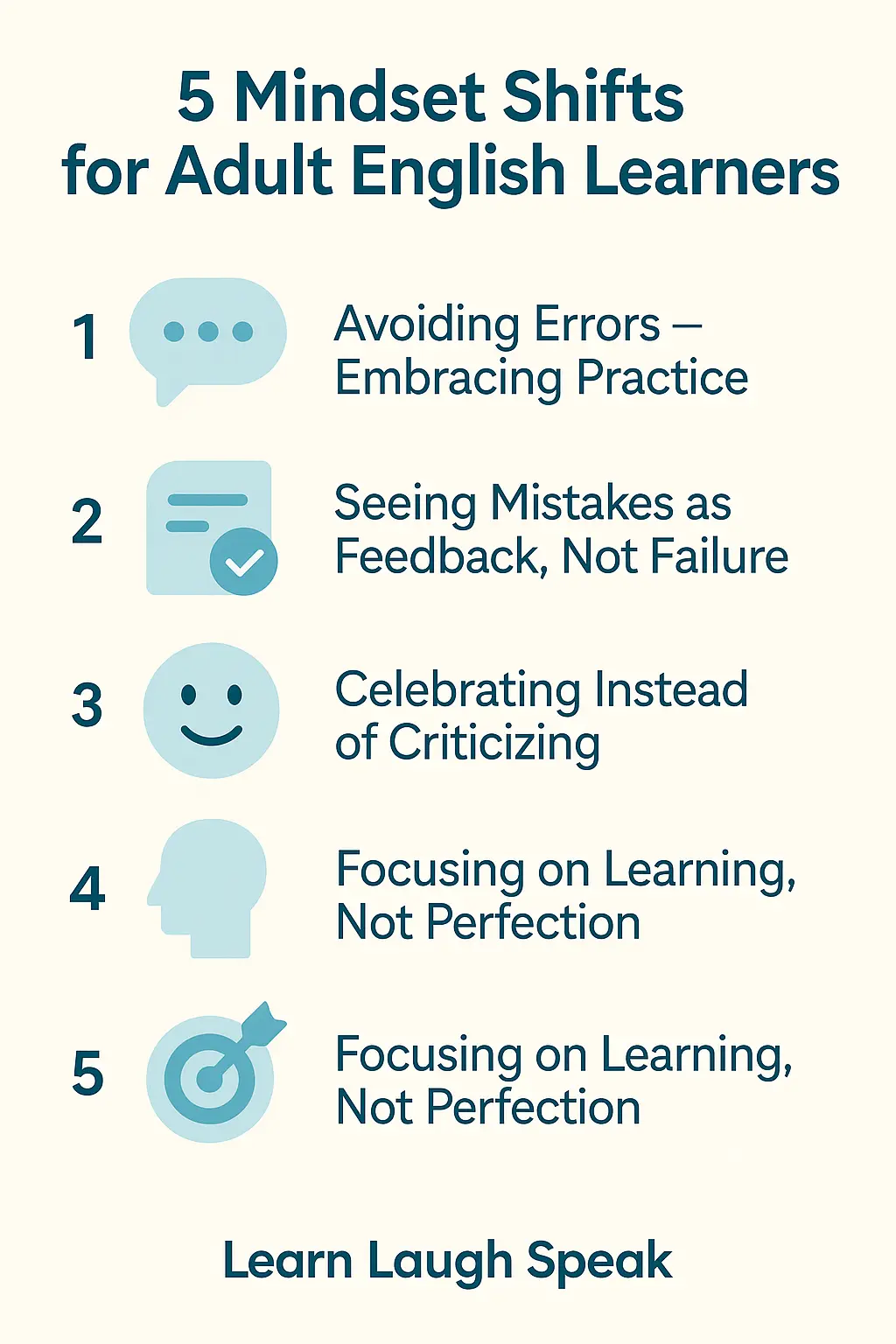Shift your mindset from perfection to progress. In fact, the most successful adult English learners transform mistakes to motivation, seeing each slip-up as a sign that their brain is learning and adjusting.
For many adult English learners, mistakes feel like proof of failure rather than progress. You might fear sounding “incorrect,” being judged, or feeling embarrassed in front of others. According to Preply’s research on challenges of adult EFL learners, adult learners often link mistakes to personal inadequacy rather than natural stages of learning.
This mindset can raise what linguist Stephen Krashen calls the “affective filter” — a psychological barrier that blocks language input when emotions like anxiety or fear are high. When this filter rises, learning slows down.
How to Know You’re Ready for the Next Step in Your Education Career

The Science Behind Turning Mistakes to Motivation
Mistakes don’t signal failure — they trigger learning. In linguistics, error analysis treats errors as essential evidence of progress. A 2024 study published by the International Journal of Scientific Research & Analysis found that learners who practiced self-error correction improved engagement and retention by over 25% (source).
Likewise, researchers have shown that language learning motivation in adults increases when feedback loops are built into study routines. This cycle — mistake → reflection → correction → success — creates measurable improvement and fuels confidence.
In other words, the key to progress lies in turning mistakes to motivation through deliberate, mindful learning.
How Mindset Shifts Propel Adult English Learners
The journey for adult English learners begins with reframing what mistakes mean. Here are three mindset shifts to guide your growth:
Avoiding Errors → Embracing Practice. Speak even if you’re unsure. Each attempt teaches your brain something new.
Seeing Mistakes as Feedback, Not Failure. When you say, “I goed” instead of “I went,” your mind flags the gap — and fills it faster next time.
Celebrating Mistakes as Progress. Reflecting on errors reinforces new neural pathways, turning small slips into learning breakthroughs.
By changing how you interpret mistakes, you unlock a powerful tool for motivation and long-term fluency.

Practical Strategies to Turn Mistakes into Motivation
Here’s how adult English learners can transform fear into confidence:
Keep a “Mistake Journal.”
Write down one error after each practice session. Reflect on what caused it and how you’ll fix it next time. Reflection transforms experience into skill.Record Yourself Speaking.
Use voice tools or mobile apps to track progress. Comparing your recordings over time helps you see improvement — a strong motivational trigger.Join Supportive Learning Groups.
According to an OECD adult learning review, learners in community-based environments complete 20% more study programs than solo learners. Community reduces fear and boosts accountability.Celebrate Every Milestone.
Finished a level? Mastered 100 new words? Celebrate it. Confidence thrives on recognition — even small wins matter.Connect Learning to Real-Life Goals.
Link each lesson to your work, travels, or personal growth. When lessons align with your goals, motivation becomes self-sustaining.
The Role of Confidence in Learning English as an Adult
Overcoming Roadblocks for Adult English Learners
Even with strong motivation, adult English learners face unique obstacles:
Time Pressure: Use micro-learning sessions (10–15 minutes) instead of waiting for long study blocks.
Fear of Judgment: Remember that most people value communication more than perfection.
Perfection Paralysis: You’ll never feel 100% “ready” — progress comes through doing.
Limited Feedback: Use structured feedback tools or tutors to avoid “fossilized errors.” A TESL-EJ study on adult EFL motivation showed that consistent feedback significantly increased learner motivation and retention.
When you identify barriers early and address them directly, each challenge turns into another step in your mistakes to motivation journey.

The Adult English Learner’s Mistakes-to-Motivation Roadmap
Commit to visible practice — speak daily, even for two minutes.
Record or write your output.
Note one mistake and plan how to fix it.
Reflect and retry.
Celebrate your improvement.
Repeat.
Every repetition rewires your brain for more fluent, confident English.
How Motivation in English Learning Impacts Student Progress
Why Learn Laugh Speak Helps You Turn Mistakes Into Motivation
At Learn Laugh Speak, we specialize in helping adult English learners use their mistakes as progress tools.
Our program includes:
33,000 CEFR-aligned lessons tailored for adults.
Real-world English designed for meetings, travel, and communication.
Feedback tools to track mistakes and improvement.
A self-paced structure so busy adults can learn effectively.
When you view every mistake as part of your journey, English learning becomes more enjoyable — and sustainable.
